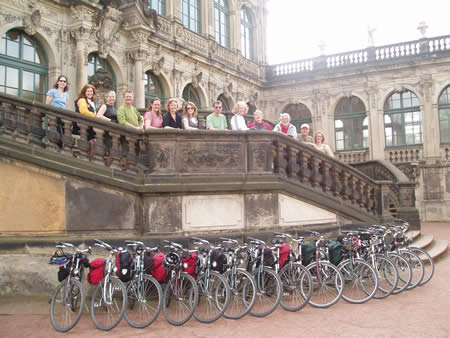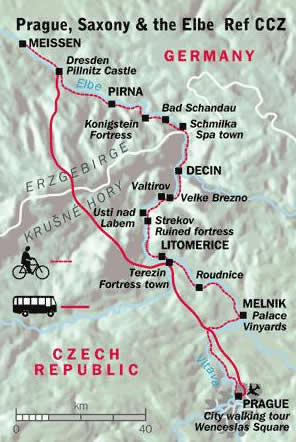I arrived back in Brighton yesterday afternoon after a week in the Czech Republic and Germany, which was great fun.
Prague was stunning and well worth another visit – the day and a bit I had there wasn’t really enough to take it all in. August is apparently a better time to visit, as it tends to get really busy in September and October.
During the first few days of cycling it rained quite a bit and was also quite windy. We also went along some busy roads through areas with a fair amount of heavy industry. Fortunately the weather and scenery improved later on during the week and we had a very enjoyable ride along the Elbe, mainly on well-maintained cycle paths. The towns we passed through or stayed in were attractive and picturesque; the food was plentiful, quite tasty and reasonably priced; and the people we met were generally friendly and welcoming.

There were 12 others in the group I travelled with, most from the UK, but also a couple of Canadians and an Australian. We ranged in age from 30something to 60something and got on well together. We also had a Polish tour leader, who rode with us, and a Polish driver, who took our luggage from hotel to hotel. Our tour leader spoke good English and a bit of German. He managed to communicate with people in the Czech Republic mainly in Polish with bits of Czech mixed in. The driver spoke Polish and some English, and while he couldn’t understand much Czech, he could understand Slovak quite well.
I used my Czech at every opportunity. Only one Czech person commented on this, asking if I was Czech. Everybody else just talked Czech to me and I did my best to understand them. I also tried out the few Polish phrases I know on our tour leader, and learned a bit more from him. In Germany I tried to speak German to people and found that those who could speak English often did so with me, even if I continued speaking German to them.
I picked up quite a few new Czech words from signs and menus – when you come across them in context every day, they soon sink in. The sight, feel, smell and taste of the food also helps me remember the menu words.
There were two native Welsh speakers in the group and I talked to them a bit in Welsh. They told me that I speak Welsh well with a good accent, and were impressed that my Welsh is self-taught. In 2003 while I was on holiday in northern Portugal, I met some Welsh speakers, but at that time I couldn’t have more than a very limited conversation. Since then I’ve been determined to become fluent in Welsh, and seem to be making good progress.

